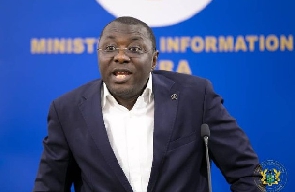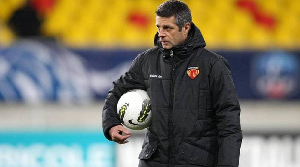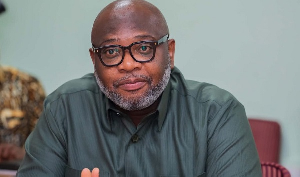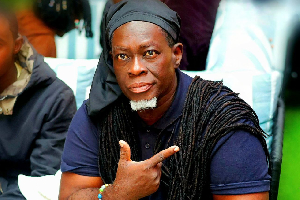Government has accused the National Democratic Congress (NDC) of extreme recklessness in negotiations of oil contracts and power contracts, as well as mismanaging the energy sector.
This, government said, is suffocating the country, over-burdening national budget and adversely affecting the pace of national development.
Reacting to a press conference by the NDC on the state of the energy sector, , a Deputy Minister of Energy, said the NDC has no moral grounding to speak on Ghana’s energy sector after such abysmal failure to manage the sector.
“Theirs was a period of deal-making instead of strategy-driven solutions,” he added.
He said the NDC almost collapsed the Tema Oil Refinery (TOR) and Bulk Oil Storage and Transportation Company Limited (BOST).
According to him, in January 2017 when the NDC handed over power, the Bulk Oil Storage and Transport Company Limited (BOST) owed $624 million to suppliers, Bulk Oil Distribution Companies (BDCs) and related parties in respect of crude oil imports for processing at TOR, as well as refined products which got lost from BOST tanks.
He explained that the NPP government has settled $567 million, saying “as at February 2020, the outstanding amount to settle to clear the books now stands at $57 million.”
Dr Amin said an audit of BOST’s accounts showed that between 2013 and 2016, there was a significant rise in the net losses by the company, with the highest net loss of GH¢569 million recorded in 2016.
70% reduction in losses in 2018
He noted that the 2018 management account showed a 70% reduction in losses from the previous year and a further 41% reduction in the loss level.
“This steady decline in the loss level of the company, from 2017 to 2019, shows that during the year 2020, the company will likely make a profit. BOST under the NPP government is in a better position,” he said.
Dr Amin said BOST continued to pursue its objectives, including holding strategic reserves of petroleum products, and that other private depots also held sufficient stocks, which together would provide enough buffer for product supply.
He said the country had a reserve of about three weeks of petrol, four weeks of diesel, eight weeks of aviation fuel and a week of Liquefied Petroleum Gas.
2M barrels of crude for broken-down TOR
On TOR, the Deputy Energy Minister said the two million barrels of crude oil referred to by the NDC was not refined at the end of 2016 because the plants were not operational.
According to him, under the stewardship of the NPP government, TOR undertook a shutdown maintenance which enabled the facility to refine the two million barrels of crude in 2017.
Touching on the incentives provided to Aker Energy, Dr Amin said: “We should understand that project economics can be enhanced with incentives when market conditions adversely affect the prospects of profitability, and the NDC knows this very well.
“The decision to incentivise the project was further informed by the imminent threat of declining crude oil production and its potential effect on our economy”.
He said the NPP government renegotiated Ghana’s free carried interest from 10% to 15% and local participation from 2.5% to 5%.
He noted that the oil production profile of Ghana showed that the contributions of the three producing fields would peak and reach plateau levels of approximately 230,000 bbls per day this year up to 2023, after which it would begin to decline if new fields were not brought online.
He said the government had recently launched a new strategy for the upstream oil and gas sector anchored on aggressive exploration and the attraction of companies with a track record.
“This has become necessary because the value of oil may decline in the future as a result of climate change and declining funding for fossil fuel projects,” Dr Amin said.
“It is, therefore, imperative that our strategy to provide incentive is aimed at exploiting as many potential reserves as we find to maximise benefits to the nation while oil is still valuable.”
The Quad Energy, a consortium of old local Ghanaian companies, who all qualify to operate in the oil and gas industry qualified by law to participate in an oil block.
Dr Amin said the government had proven to be better managers of the oil and gas sector by renegotiating the domestic gas price from $8.8 per mmBtu to $6.08 per mmBtu that would have been lower if Sankofa gas price was less expensive.
He announced that government has commenced an initiative called the Energy Sector Recovery (ESR) programme to ensure all debts in the sector are paid within the next five years.
He explained that the government had managed the sector better, and with the ESR, the state would recover its debts for a solid and financially healthy energy sector.
Dr Amin stated that the NDC’s solution to dumsor was to sign several unwanted power contracts, some of which today have imposed serious financial burden on the state due to excess capacity payments.
“In 2018, the cost of excess power generation capacity was an estimated $320 million in capacity charges.
“As a result of new power plants commissioned in 2019, the excess generation capacity increased the capacity charge costs to $620 million annually.”
“Power contracts are signed on take-or-pay basis, which means that the cost of power has to be paid whether the power is used or not. This is what has given rise to the excess power payments,” he added.
He explained that under the current Public Utilities Regulatory Commission (PURC) methodology for electricity, capacity charges for excess capacity generation are not included, compelling government to find money to finance part of this.
Dr Amin stated that all the Petroleum Agreements that are producing crude oil in Ghana were signed by the Kufuor government.
According to him, out of the 13 agreements signed by the NDC between 2013 and 2016, the only companies that have met their minimum obligations are Eni Ghana Exploration and Production Ltd and Springfield Exploration and Production (SEP) Limited.
Business News of Monday, 17 February 2020
Source: thefinder.com













